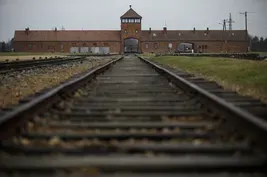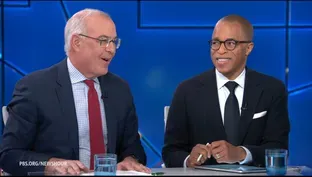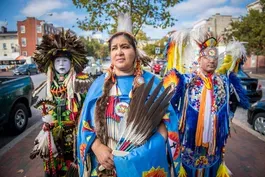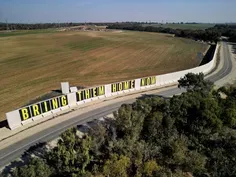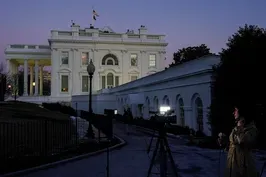
Trump considers major changes to federal disaster response
Clip: 1/24/2025 | 8m 54sVideo has Closed Captions
Trump questions need for FEMA and says states should 'take care of disasters'
President Donald Trump jetted off for the first trip of his second administration to tour one sprawling disaster zone after the other. The president is in California where he'll survey damage from the wildfires that are ravaging the Los Angeles area. But first, he stopped in North Carolina, four months after Hurricane Helene, and threatened the future of FEMA. Laura Barrón-López reports.
Major corporate funding for the PBS News Hour is provided by BDO, BNSF, Consumer Cellular, American Cruise Lines, and Raymond James. Funding for the PBS NewsHour Weekend is provided by...

Trump considers major changes to federal disaster response
Clip: 1/24/2025 | 8m 54sVideo has Closed Captions
President Donald Trump jetted off for the first trip of his second administration to tour one sprawling disaster zone after the other. The president is in California where he'll survey damage from the wildfires that are ravaging the Los Angeles area. But first, he stopped in North Carolina, four months after Hurricane Helene, and threatened the future of FEMA. Laura Barrón-López reports.
How to Watch PBS News Hour
PBS News Hour is available to stream on pbs.org and the free PBS App, available on iPhone, Apple TV, Android TV, Android smartphones, Amazon Fire TV, Amazon Fire Tablet, Roku, Samsung Smart TV, and Vizio.
Providing Support for PBS.org
Learn Moreabout PBS online sponsorshipGEOFF BENNETT: Welcome to the "News Hour."
President Donald Trump set off for the first trip of his second administration today, touring multiple disaster zones.
AMNA NAWAZ: The president is in California tonight, where he will survey damage from the wildfires that are ravaging the Los Angeles area.
But, first, he stopped in North Carolina, four months after Hurricane Helene, and threatened the future of FEMA.
Laura Barron-Lopez begins our coverage.
LAURA BARRON-LOPEZ: This morning, President Donald Trump touching down in Western North Carolina, stop number one of a cross-country disaster tour.
Hurricane Helene brought historic, catastrophic floods to the state last September.
Four months later, Trump again made the recovery political.
On the tarmac in Asheville, Trump questioned the need for a federal response.
DONALD TRUMP, President of the United States: To have a group of people come in from an area that don't even know where they're going in order to solve immediately a problem is something that never worked for me.
I'd like to see the states take care of disasters.
Let the state take care of the tornadoes and the hurricanes and all of the other things that happen.
LAURA BARRON-LOPEZ: Shortly after, Trump said he would sign an executive order to gut FEMA.
DONALD TRUMP: I think we're going to recommend that FEMA go away.
LAURA BARRON-LOPEZ: Eliminating the agency would take an act of Congress.
And while FEMA assists states in disaster response, it's only at the request of governors.
By afternoon, Trump was shaking hands with families in storm-battered Swannanoa, a small town outside Asheville.
DONALD TRUMP: You need your riverbanks fixed.
You need a lot of roads fixed, and we're going to get it done in rapid time.
LAURA BARRON-LOPEZ: All this while in Washington... DONALD TRUMP: In my second term, we will again stand proudly for families and for life.
LAURA BARRON-LOPEZ: ... the annual March for Life, where Trump made a simultaneous virtual appearance via prerecorded video, crowds of anti-abortion protesters watching on.
REP. MIKE JOHNSON (R-LA): We believe that every child has the right to life.
LAURA BARRON-LOPEZ: The event featured a lineup of Washington's new Republican leadership... J.D.
VANCE, Vice President of the United States: We are proud to march with you.
LAURA BARRON-LOPEZ: ... including Vice President J.D.
Vance.
Meanwhile, on Capitol Hill, the Senate is set to hold a final confirmation vote on Trump's nomination for secretary of defense, Pete Hegseth.
Two senators, Lisa Murkowski of Alaska and Susan Collins of Maine, were the only Republicans to vote against Hegseth in yesterday's procedural vote.
Hegseth can only afford to lose one more Republican if all Democrats vote no.
Before departing the White House this morning, Trump said he has his eyes on the narrow margin.
DONALD TRUMP: I don't know what's going to happen.
You never know with those things, but Pete's a very, very good man.
I hope he makes it.
I hope he makes it.
But I was very surprised that Collins and Murkowski would do that.
LAURA BARRON-LOPEZ: The next leg of Trump's disaster tour will be in Southern California, where he plans to visit areas flattened by wildfires and others still under active threat.
DONALD TRUMP: They turned off the water.
LAURA BARRON-LOPEZ: Today, the president repeated claims that California mismanaged its water flow and falsely blamed a rare type of fish.
DONALD TRUMP: Everyone's trying to figure out, why aren't they turning it back.
They say it's the delta smelt.
It's a fish, but I find that hard to believe.
LAURA BARRON-LOPEZ: Fire and water officials have refuted Trump's claims, saying fish conservation efforts in Northern California did not impact water availability in the southern part of the state.
Still, the president threatened to condition aid to California unless the Golden State complies with his demands.
DONALD TRUMP: I want to see two things in Los Angeles, voter I.D., so that the people have a chance to vote, and I want to see the water be released and come down into Los Angeles and throughout the state.
LAURA BARRON-LOPEZ: Governor Newsom's office responded to the president's demands on social media, saying, "Conditioning aid for American citizens is wrong," and that California does require identification to be registered to vote -- Amna.
AMNA NAWAZ: Laura, tell us more about what we should understand about the conditions that President Trump is laying out here and also what experts are saying about the claims he's making to justify that.
LAURA BARRON-LOPEZ: So, first, I want to say that this has been a long-running fight that the president has picked with Gavin Newsom and with California.
But in addition to the voter I.D.
and redirecting water conditions, the president has suggested that California needs to end those protections for the endangered delta smelt that we mentioned, even though fire and water policy officials and emergency management experts that we spoke to all say that Trump's attacks on Newsom and on California are either misleading or outright false.
And they say that Trump's proposed conditions are not necessarily rooted in science or recovery.
And it's also inaccurate that water is somehow being withheld.
The issue is more about how dense and urban the city of Los Angeles is and the ability to fight the fire there.
And a number of California Republicans in the House themselves have said that they believe that aid should not be conditioned.
AMNA NAWAZ: There are, we should point out, some kinds of conditions, some forms of condition disaster relief that are becoming more bipartisan and more popular.
Tell us about those.
LAURA BARRON-LOPEZ: There is a growing consensus among emergency management experts and former FEMA officials that conditions could be needed, as well as changing the federal relief system, that that is also warranted.
But they say that the conditions have to be focused on infrastructure and recovery, like what kind of materials are used to make homes more resistant to fires and floods.
There should be no vegetation near buildings.
Wider lanes are needed for evacuation, asphalt that's resistant to heat.
Essentially, how you build, where you build, and the materials you build with is what conditions should be used.
And experts I spoke to like Jesse Keenan, who's the director of climate change and urbanism at Tulane University, said opening the door to conditions that have nothing to do with recovery like voter I.D.
could also end up hurting red states.
JESSE KEENAN, Director of Climate Change and Urbanism, Tulane University: At the end of the day, in this country, red states and counties have many more presidential declarations than Democratic and blue states and counties.
And this weaponization, this anti-California bias in your policymaking is only going to come back to hurt you when you begin to apply this to Texas, to Louisiana, to Mississippi.
LAURA BARRON-LOPEZ: But I also spoke to former officials who worked in Donald Trump's first administration who said that he may simply just decide to apply conditions to blue states like California and leave red states alone.
AMNA NAWAZ: Well, speaking of his first administration, we should remind folks that, in that first time in office, he made similar threats, delayed aid while in office.
Remind us how that played out then.
LAURA BARRON-LOPEZ: In his first term, Donald Trump delayed billions in aid to Puerto Rico after Hurricane Maria.
And his White House also obstructed an investigation, according to an internal watchdog, into why those billions were delayed.
He also diverted FEMA money from FEMA to deportation of migrants to Mexico.
And former Trump officials revealed last year that, during his first term, he withheld aid to California and that he didn't change his decision until he was shown by staffers that where the wildfires had hit in Orange County, he was shown congressional maps and realized that there were Republican voters in those areas and then decided to release the funds.
And I spoke to Kevin Carroll, who served in the Homeland Security under Trump's first term, and said that the president makes decisions like this based on whether or not he believes that the areas affected have voters and people that supported him.
AMNA NAWAZ: So, Laura, if there were no federal help from California or other states, if disaster relief was left up to the states as President Trump is articulating, what would be the consequences?
LAURA BARRON-LOPEZ: Jesse Keenan of Tulane added that states are left on their own -- if they're left on their own to handle these extreme disasters, it would significantly hurt local economies, whether it's blue states or red states.
JESSE KEENAN: If the federal government pulls out, home prices go up, rents go up, the cost of living goes up, your taxes go up.
It's a terrible situation in economic terms.
LAURA BARRON-LOPEZ: Overall, the experts that I spoke to acknowledge that, yes, FEMA is stretched thin, but to do away with FEMA potentially entirely, as the president is suggesting, is unsustainable and would hurt a number of states, because, ultimately, states need that recovery help from FEMA.
It helps recovery go faster and it's something that they rely on significantly, Amna.
AMNA NAWAZ: All right, our White House correspondent, Laura Barron-Lopez.
Laura, thank you.
LAURA BARRON-LOPEZ: Thank you.
Auschwitz survivor's family searches for answers
Video has Closed Captions
Holocaust survivor's family searches for answers while retracing her steps at Auschwitz (12m 3s)
Brooks and Capehart on the busy first week for Trump
Video has Closed Captions
Brooks and Capehart on the busy first week of the new Trump administration (10m 53s)
Lumbee Tribe gets Trump endorsement for federal recognition
Video has Closed Captions
North Carolina's Lumbee Tribe gets Trump's endorsement for federal recognition (5m 16s)
News Wrap: Hamas names 4 hostages it intends to release next
Video has Closed Captions
News Wrap: Hamas names 4 Israeli hostages it intends to release next (5m 58s)
State Department suspends foreign aid for 3 months
Video has Closed Captions
State Department suspends nearly all U.S. foreign aid for 3 months (2m 42s)
Women's 3x3 basketball league builds on WNBA's surge
Video has Closed Captions
Women's 3x3 basketball league 'Unrivaled' builds on WNBA's surge (5m 22s)
Providing Support for PBS.org
Learn Moreabout PBS online sponsorshipMajor corporate funding for the PBS News Hour is provided by BDO, BNSF, Consumer Cellular, American Cruise Lines, and Raymond James. Funding for the PBS NewsHour Weekend is provided by...

